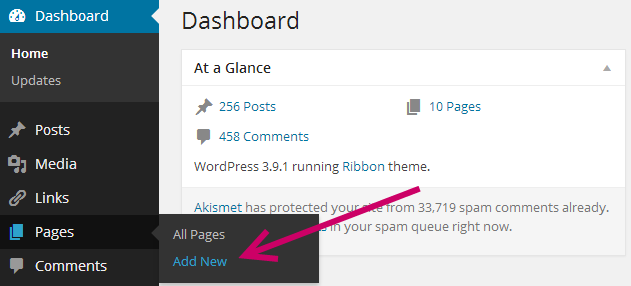You’ve probably heard of WordPress. After all, it is the most popular blogging platform available. However, WordPress is not just for blogging. It is a useful content management system and can be used to create websites with ease.
If you want to join the masses and create a website without having to invest in web design software or hire a web designer, use WordPress is worth considering.
Now is the time for us to tell you that we offer fantastic WordPress hosting with a one-click installer to get you set up in no time.
Check out our range WordPress packages here!
So, what is the difference between a website and a blog, and by extension, the difference between a web page and a blog post?

Websites vs. blogs
By definition, a website is “a place on the world wide web that contains information about a person, organization, etc., and generally consisting of many web pages linked by hyperlinks”, while a blog is “a website where someone writes about personal opinions, activities and experiences”.
While those definitions imply that the difference has a lot to do with commercial versus personal use, that’s not entirely accurate. After all, a business might have a blog and a person might have a website.
With a website, pages tend to be more static in nature. For example, a business website might have a home/welcome page, an about us page, a products and services page, and an FAQ page, all of which remain unchanged for months.
In contrast, a business blog is constantly updated with new entries. The “home” page of a blog usually displays the most recent entry. Blogs are more dynamic than websites. Blogs also tend to encourage visitors to interact by leaving comments.
Using WordPress, you can create two types of content: pages and posts. Pages are traditional, static web pages, while posts are timestamped posts that are placed on blogs.
If you are going to use WordPress to build a standard website and not a blog, each time When you create a new page, it will choose “add new page” instead of “add new post”.
Related: The Complete Guide to WordPress
To create a website using WordPress
First you need to install WordPress on your web hosting package. This can be done manually, or if you host with LCN.com, you can use our one-click installer application.
Even manual installation is quite simple; First you will need a few things:
- Your host’s FTP details (host, username and password)
- MySQL database access
- WordPress Installation Files (available here)
Then follow WordPress’ ‘Famous 5-Minute Installation’ here.
Now that you’ve installed WordPress, let’s get started! create your static website!
By default, WordPress will create a blog so that all your posts are displayed on the front page. You will need to change this by first creating a static page and then setting it as your home page. According to WordPress support, this is how:
- Login to your WordPress site
- Click Pages > Add New

- Give it a title like “Home” and write your welcome message

- Post your home page by clicking Post
- Click Posts > Add New
- Give it a title like “Blog” and don’t worry about adding content
- Publish the “Blog” page by clicking publish
- Click Settings > Reading
- In Reading Settings, you will need to change the display Alization of the home page to display a static page.

- On the home page, select “Start”.
- On the Posts page, select “Blog.”
Related: Migrating WordPress to a New Host
Remove blog from menu
If you don’t intend to add blog posts to your website, you’ll also want to make sure “Blog” doesn’t appear in your menu. Do this by going to Appearance > Menus and then removing Blog from the Main Menu. Click Save Menu.
Adding Static Pages
Now that your WordPress website has a static home page without displaying the blog, it’s Time to add more static pages, click Pages > Add New and create your next page, such as ‘About Us’ or ‘FAQ’.
Give the page an appropriate title and enter your text in the main content editor.Click Publish once you are happy with the content.
Disable Comments
Finally, you may want to disable comments by going to Settings > Discussion and then unchecking “Allow Comments”.

That’s pretty much it for creating a static website with WordPr ess. We have removed all the blog style elements and now you can create new pages and edit your content at will, without the need for web design. igner.
For more reading and information on using WordPress as a CMS/static website, check out these great resources.
Have your say!
Have you used WordPress before to create a static website? How did you get in? Let us know if you have any tips or tricks in the comments below.
.
